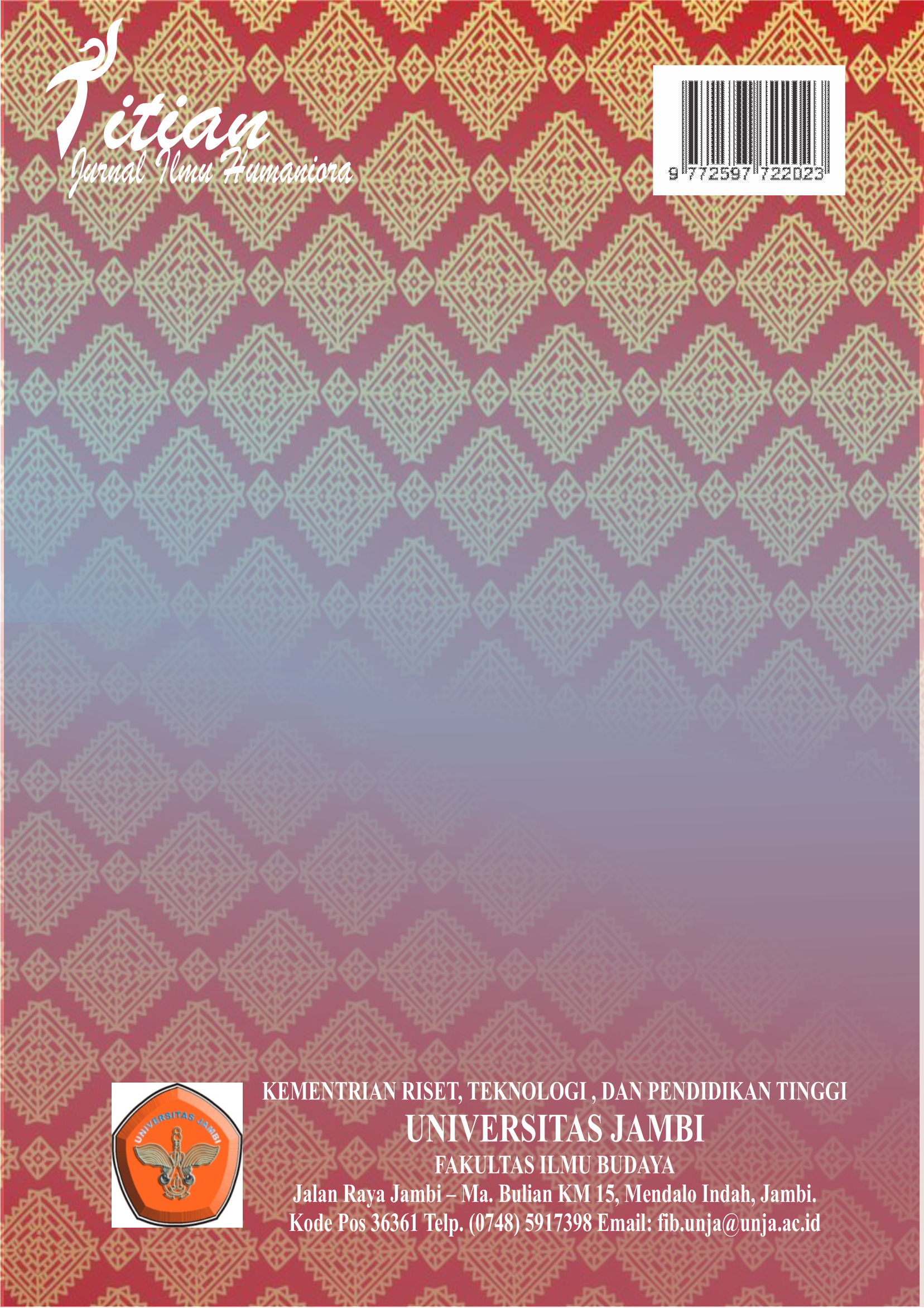Tradisi Adat Kalomba: Kajian Makna dan Nilai Budaya Pada Masyarakat Desa Bonto Biraeng Kabupaten Bulukumba
DOI:
https://doi.org/10.22437/titian.v5i2.15371Keywords:
Kalomba, meaning, tradition, valueAbstract
Abstract
The purpose of this study is to determine the process of the Kalomba tradition, meanings and values
contained in the traditional process of the Kalomba tradition. Kalomba tradition is a tradition carried
out by the Kajang Tribe aimed at the age of children to avoid skin diseases. The method used in this
research is qualitative with an ethnographic approach. Determination of informants using purposive
sampling and snowball sampling. Data collection was carried out through interviews, observation and
documentation as well as data analysis consisting of data collection, data reduction, data presentation
and deduction. The results of this study revealed that the Kalomba tradition began during the Karaeng
Padulu Soreang period whose marriage was not approved and then a child was born. When parents
who do not agree to meet must fulfill these terms and conditions, this is known as Kalomba. The
traditional Kalomba tradition is carried out based on stages starting from the ma'jenne procession,
burning incense and lighting candles, reading prayers, waving incense smoke, tompong procession,
baccing children procession, paddingi-dingi stage, massolo (giving money to children) and the event
ends the setting of kampalo on eating together by family and relatives.The meaning of the Kalomba
tradition is as medicine and safety to avoid skin diseases and as a thanks giving from parents to
children. The Kalomba tradition reveals the value of helping each other and togetherness, establishing
friendship and responsibility.
Downloads
References
Ahuluheluw, M. (2018). Amma Toa—Budaya (Kearifan Lokal) Suku Kajang Dalam Di
Bulukumba Sulawesi Selatan. Prosiding Seminar Nasional Dan Call For Paper Peranan
Psikologi Bencana Dalam Mengurangi Risiko Bencana, 54–67.
http://ejournal.unbi.ac.id/index.php/semnaspsikologibencana/article/view/58.
Daulay, I. R., Ws, H., & Manaf, N. A. (2013). Nilai-Nilai Edukatif dalam Lirik Nyanyian
Onang-Onang pada Acara Pernikahan Suku Batak Angkola Kabupaten Tapanuli Selatan
Provinsi Sumatera Utara. Bahasa, Sastra, dan Pembelajaran, 1(3), Article 3.
http://ejournal.unp.ac.id/index.php/bsp/article/view/5018.
Hafid, A. (2013). Sistem Kepercayaan pada Komunitas Adat Kajang Desa Tanah Towa
Kecamatan Kajang Kabupaten Bulukumba. Patanjala : Jurnal Penelitian Sejarah dan
Budaya, 5(1), 1. https://doi.org/10.30959/patanjala.v5i1.150.
Nursyam, N. (2018). Tradisi Adat Kalomba Sebagai Penguatan Identitas Masyarakat Kajang
Luar [Masters, UNIVERSITAS NEGERI MAKASSAR]. http://eprints.unm.ac.id/11050/.
Rijali, A. (2019). Analisis Data Kualitatif. Alhadharah: Jurnal Ilmu Dakwah, 17(33), 81–95.
https://doi.org/10.18592/alhadharah.v17i33.2374.
Sembiring, S., Sismudjito, D., & Si, M. (2015). Pengetahuan dan Pemanfaatan Metode
Pengobatan Tradisional pada Masyarakat Desa Suka Nalu Kecamatan Barus Jahe. 3, 14.
Siddiq. M, S., H. (2019). Etnografi Sebagai Teori dan Metode | Siddiq | Kordinat: Jurnal
Komunikasi antar Perguruan Tinggi Agama Islam, 18(1), 23-48. DOI:
15408/kordinat.v18i1.11471.http://journal.uinjkt.ac.id/index.php/kordinat/article/view/
Siregar, N. S. S. (2016). Kajian tentang Interaksionisme Simbolik. Perspektif, 1(2).
https://doi.org/10.31289/perspektif.v1i2.86
Sugiyono. (2013). Metode Penelitian Kuantitatif, Kualitatif dan R&D. Bandung: Alfabeta.
Downloads
Published
How to Cite
Issue
Section
License
Copyright (c) 2021 Ainun syafitri Muslimin, Andi Kurniawan, Nunu Vebriani, Nurul Hikmah

This work is licensed under a Creative Commons Attribution-ShareAlike 4.0 International License.































